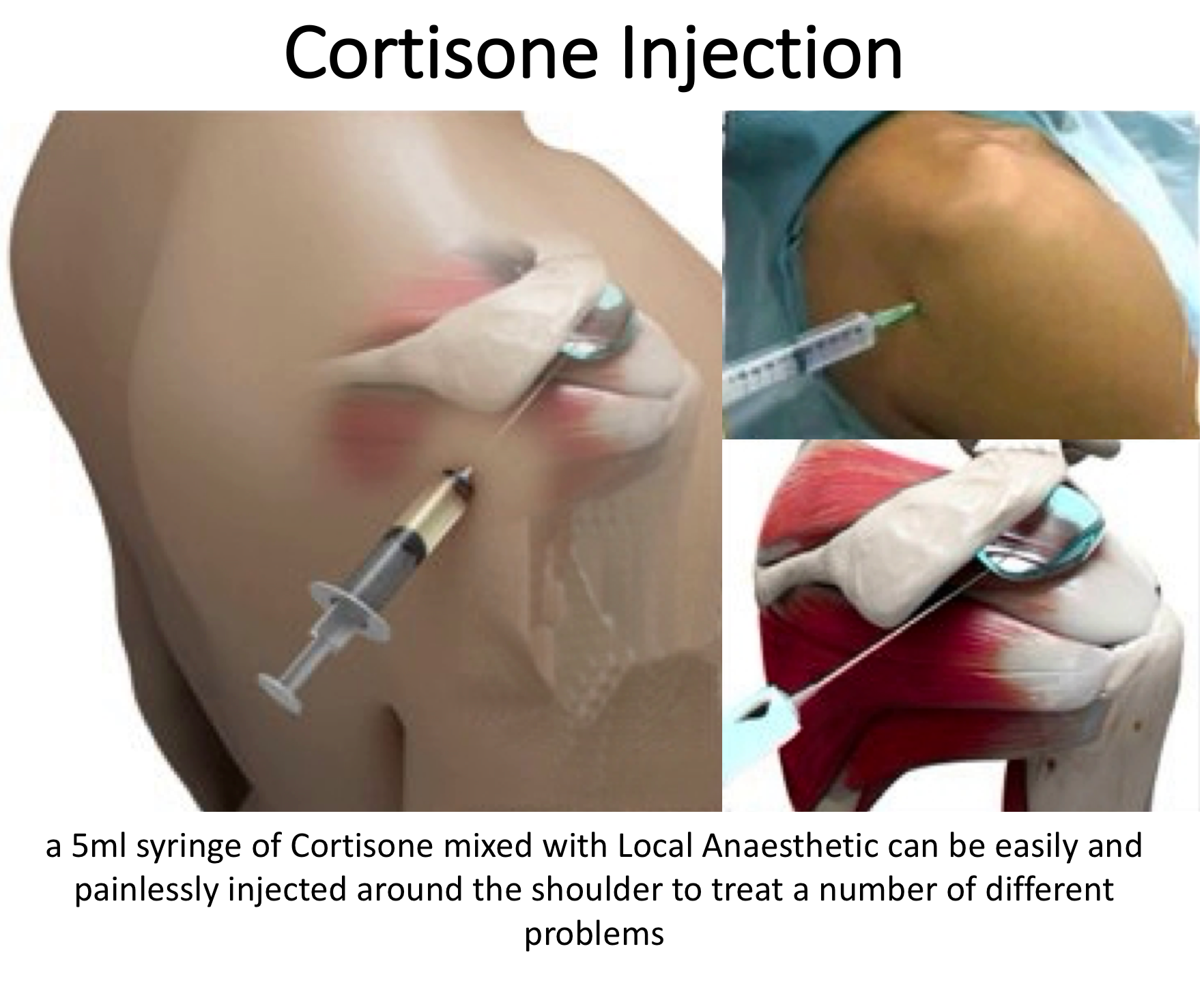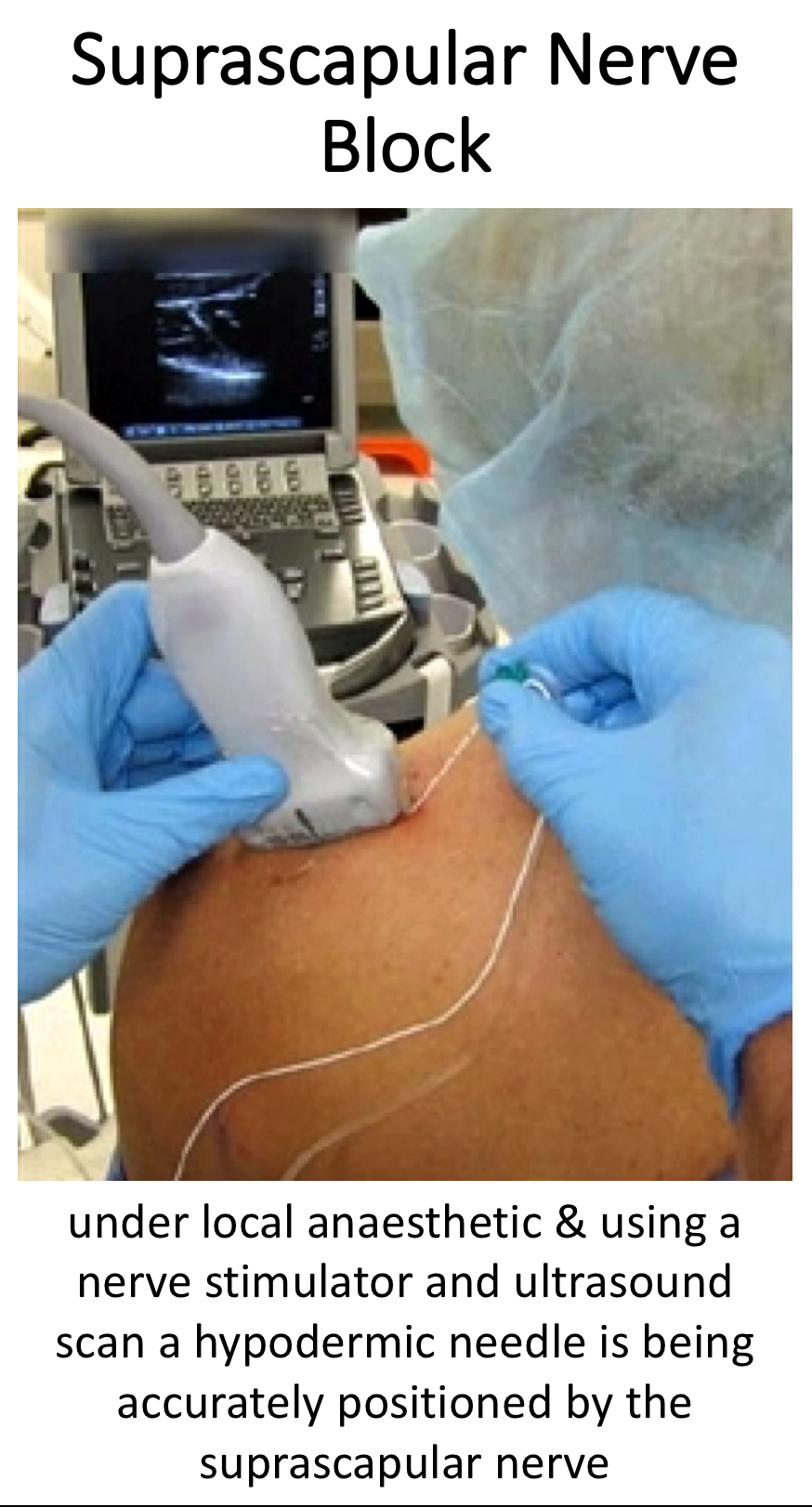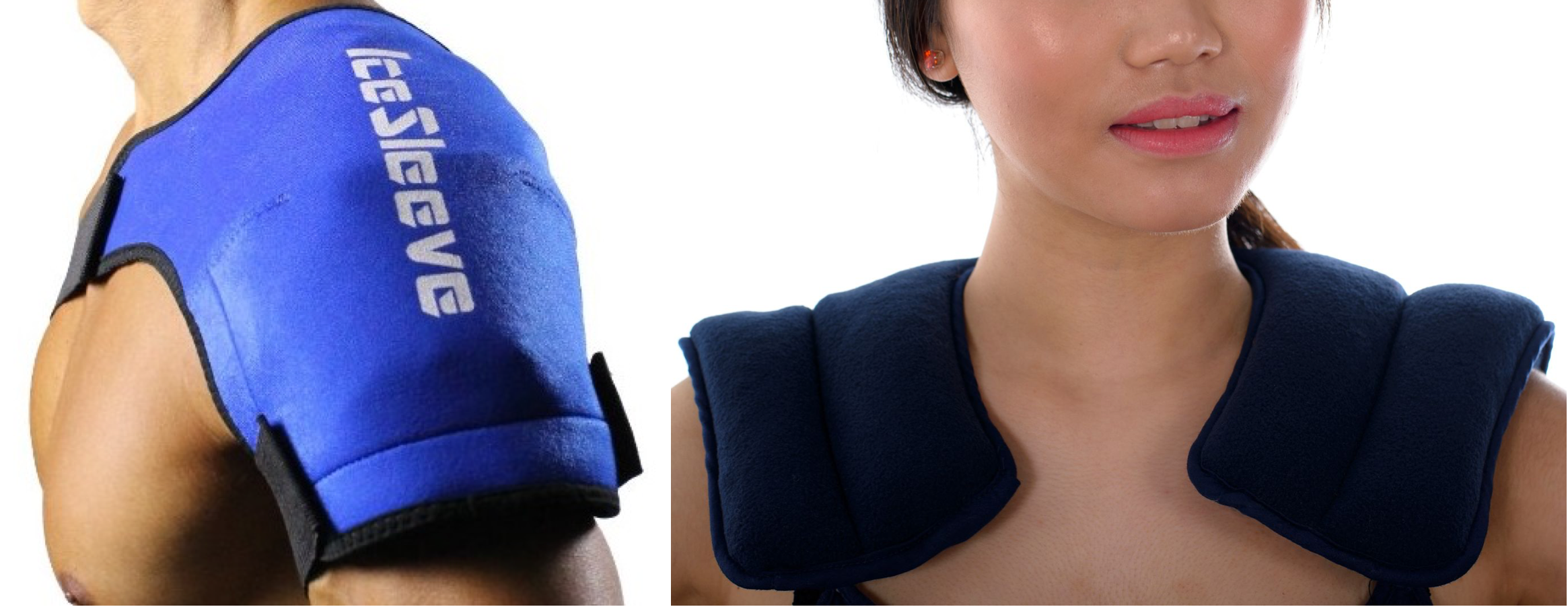Pain Relief
Pain Management for Shoulder Problems
- Shoulder problems and injuries can be very painful. Pain can range from minor discomfort on certain specific movement to a constant severe pain spreading up into the shoulder blade, up into the neck and down into the arm. Frustratingly, shoulder pain is often made worse when lying down and at night!
- The aim of treatment for any shoulder problem is to settle the pain and to regain function. Usually, before any meaningful exercise or rehabilitation programme can be started, significant pain or inflammation needs to be adequately controlled. The main form of pain management is achieved by using drugs / analgesics of varying potency but other forms of treatment such as ice, heat, ultrasound and alternative therapies can be used.
- Every drug and medication will have some form of side-effect and, generally, the stronger the analgesic is the bigger the trade-off with regards to side-effects. The most sensible approach to Pain Management for a shoulder problem is to use an ‘Ascending Ladder’ of analgesics aiming to use the least ‘potent’ medication required to obtain adequate pain relief.
- Although I originally qualified as a Doctor I have a specialised as an Orthopaedic Surgeon for over 20 years. Whilst I am happy to give general advice on pain management I usually recommend the prescribing of medications and treatment should be done by the experts! This would usually be a patient’s Family Doctor, the Anaesthetist or a Pain Management Physician.
Analgesics / Pain Medication
Most Shoulder pain can be controlled by oral/tablet analgesics. Analgesic relief in the form of patches and liquids is also available but is something that is usually prescribed by a Family Physician or Pain Specialist. The strongest type of analgesia is administered intravenously and is something that is only used in the Hospital environment, usually after surgery.
Oral Analgesics
- NSAID (Non-Steroidal Anti-Inflammatories) –
- NSAIDs work by reducing the painful inflammatory response
- NSAIDs can damage the stomach lining and affect the kidneys. It is important that a patient’s Family Doctor prescribes this medication if it is going to be used for a longer term
- Additional Medications, such as Ranitidine (H2 antagonist) or Omeprazole (proton-pump inhibitor), may be required to protect the stomach.
- Codeine based Analgesics –
- Codeine based analgesics are pain killers and affect a patient’s perception of pain. As a result, they can have some effect on consciousness depending on their strength
- Codeine based analgesics can lead to constipation if taken for a longer time. Having a high-fibre diet or even taking laxatives might need to be considered
- Nociceptive Analgesics –
- Nociceptive pain killers work on nerve generated pain
- Amitriptyline in lower doses works as a nociceptive pain killer. It has a useful side-effect in that it can make patients drowsy
- in cases of severe pain Amitriptyline can be prescribed at night
- Gabapentin &Pregabalin–
- Gabapentin &Pregabalin have a beneficial effect on chronic neuropathic pain
- They can be prescribed in cases of severe, chronic nerve pain and following nerve injuries
- Treatment is usually started with a gradually increasing dose until building up to a maintenance dose
Cortisone Injection
- Cortisone is a corticosteroid that is naturally produced by the body’s Adrenal Gland. Injectable Cortisone is synthetically produced and has a very powerful ant-inflammatory action. When injected around the shoulder it has the potential of settling severe inflammation, allowing the patient to undertake their rehabilitation exercises.
- injections can be used for Supraspinatus Tendonitis, Biceps Tendonitis, Acromioclavicular Joint & Glenohumeral Joint Arthritis, Frozen Shoulder and for Post-Surgical Pain & Inflammation
- A Cortisone injection can be easily administered in the Out-Patient Clinic. It is a quick and relatively painless procedure. Afterwards patients can continue with their normal day-to-day activities. Occasionally patients can feel a bit of soreness around their shoulder later that day, but this usually passes fairly quickly
- It often takes several days before someone notices the benefits following a Cortisone injection and sometimes several weeks. The Cortisone works in the background and there is no specific requirement to particularly rest the shoulder or to do extra exercises. The full benefits of a Cortisone injection are usually felt well within a month. In some cases, the Cortisone may not give any benefit, this may be an indication of the severity of the problem.
- A Cortisone injection only lasts in the body for a few days. Any benefit that someone gets from the Cortisone will be from its acute anti-inflammatory effect allowing any inflammation to settle. If the symptoms do return after a while, it is not because the Cortisone has worn off, but because the inflammation has returned.
- Infections can occur after any type of injection but are extremely rare (1 in 15,000). If someone feels that they are developing an infection within 48 hours of a Cortisone injection they should seek advice from their Family Practitioner.
Nerve Blocks
- Occasionally a patient can have a shoulder problem that cannot be treated by surgery or continues to cause severe pain despite the mechanical problem having been adequately treated.
- This may occur with massive in-operable rotator cuff tears or in severe arthritis where a patient does not want or is not fit enough to undergo surgery.
- In this situation, it is possible to ‘block’ the nerve that supplies this area from registering pain, whilst the actual problem remains untreated.
- When a nerve is ‘blocked’ it stops working completely, so this option is only possible for certain nerves that supply a very specific area
- The commonest nerve block around the Shoulder is a Suprascapular Nerve Block
- Suprascapular Nerve Block
- The Suprascapular Nerve supplies the motor power for the supraspinatus and infraspinatus muscles and most of the pain sensation for the shoulder
- A selective Suprascapular Nerve Block can alleviate a lot of the pain sensation from around the shoulder but does have some effect on muscle function
- However, in patients with massive Rotator Cuff Tears and with severe arthritis the loss of muscle function has negligible effect
- A Suprascapular Nerve Block is undertaken by an Aneasthetist who specializes in nerve blocks
- The procedure is usually done as a Day Case procedure
- An Ultrasound Scan and nerve stimulator are used to accurately locate and direct a hypodermic needle to the Suprascapular Nerve where it passes through the Suprascapular Notch
- Long acting local anaesthetic is then injected around the nerve
- An initial nerve block is always temporary and will last about 3 months, this is to make sure that there are no unwanted ‘side-effects’
- A more permanent ‘nerve block’ can then be undertaken
Find out more about nerve blocks….
Additional Pain Treatments
The mainstay of pain relief for Shoulder Problems is based on the medications listed above. However, there are a number of other pain treatments that can be used to augment pain relief. These can usually be used in addition to pain medications.
Ice& Heat
- Ice
- Ice has traditionally been used to treat soft tissue injuries where there is swelling and pain
- Studies have shown that ice can be helpful in reducing swelling and pain around surgical wounds
- Some patients find Ice Packs to help with pain control, particularly after surgery or an acute injury
- Whilst ice can reduce the level of pain, there is no evidence to show that it actually contributes to the speed of recovery
- There are many types of Shoulder Ice Pack systems commercially available
- Heat
- Heat is an effective and safe treatment for more chronic aches and pains
- Heat causes blood vessels to dilate bringing more blood into the area to stimulate healing
- Heat should not be used in acute injuries as it can increase bleeding around the damaged area and make the injury worse
- Some patients find Heat Pads help with the control of chronic aching pains around the shoulder
- There are many types of Shoulder Heat Pad systems commercially available
Alternative Therapies
There are a number of Alternative Therapy treatments that are used to help with pain. These include acupuncture and homeopathic medicines. I have no experience and knowledge with regards to these and there is little in the literature with regards to their true clinical efficacy. However, I have had patients that feel that such treatments have helped them.
My view is, that if someone feels they are getting some benefit from these treatments, and as long as there are no risks or side-effects, there may be some benefits.





